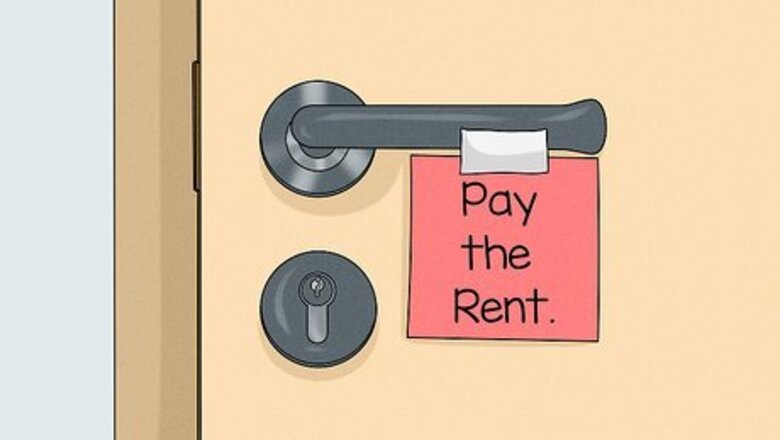
views
Deciding to Evict
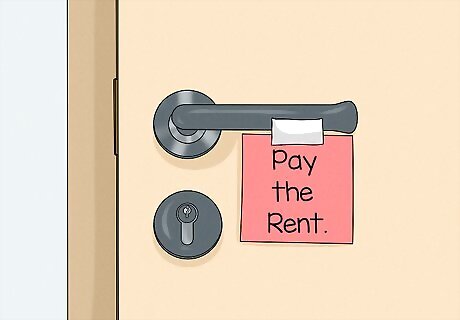
Determine if you have just cause to evict. Evicting a tenant is something that should be done as a last resort, and you must have just cause to do it. Having a personality conflict or disliking your tenant for other reasons probably doesn't count as legal grounds to evict. However, if your tenant won't pay rent or is engaging in illegal activity on the premises, you might have grounds to evict. The laws differ from state to state so look into your state's laws to find out if you have just cause. The following causes are usually grounds for eviction: The tenant hasn't paid rent. The tenant has violated the terms of the lease (such as getting a dog even though the lease explicitly states that no pets are allowed). The tenant has severely damaged the property. The tenant is conducing illegal activity, such as selling drugs from the property. You wish to evict the tenant for your own reasons, and your state's laws entitle you to do so. In some states a landlord can evict a tenant with 30 to 60 days notice for reasons unrelated to the tenant's behavior. For example, a landlord may need to evict tenants if he or she sells the building or needs to renovate the complex.

See if you can reason with the tenant first. You might be able to get the outcome what you want without resorting to eviction. In this best-case scenario, the tenant pays up or otherwise amends the situation without your having to issue a formal notice. You can call the tenant or meet in a public place to discuss the problem. Calmly and clearly let the tenant know that if he or she doesn't correct the situation, you'll have to take formal steps to collect what you're owed. Do not issue threats or try to intimidate the tenant. This could get you in legal trouble later.
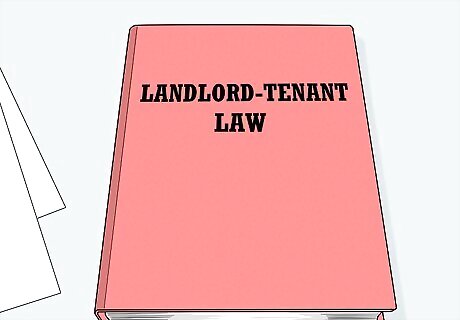
Know your state's laws. In addition to learning about the US Landlord and Tenant Act, which specifies certain standardized laws that may have been adopted in your state, you should get familiar with the specific version of the laws in your state. Do an online search for landlord tenant laws in your state and carefully read the laws and the instructions on how to evict a tenant. Information and forms about landlord tenant laws in your state should also be available from your local courthouse. Getting familiar with your state's laws will help you navigate what can be a complicated process. It's very important to follow each step correctly so that the tenant doesn't end up getting the upper hand.

Consider hiring an attorney. Establish a relationship with an attorney who can advise you when dealing with tenants, especially if you own more than one rental unit. Some attorneys will advise landlords on a flat-fee basis rather than charging the full cost of representation each time you need their services. An attorney can help you make sure you follow the eviction process perfectly and get the outcome you want. In many cases, if you make a mistake on the forms or procedures, the court may force you to start over with proper forms and procedures, thus further delaying the eviction. In the worst case, your mistakes could give the tenant the legal right to counter-sue you, not to mention delaying the eviction for 6 months or more (under non-retaliation laws).
Giving Notice of Eviction
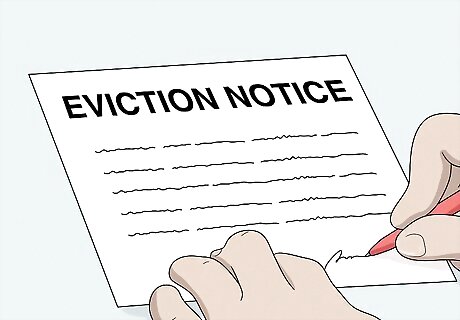
Fill out an eviction notice, naming all the tenants and other occupants. Use the proper forms for your state and jurisdiction when handling a tenant eviction; never use generalized forms or forms that you created, since they might not have the exact information you need to legally evict a tenant in your state. In most cases, your state will provide a template for one of the following types of eviction notices: Notice to Pay Rent or Quit: This is used when rent has not been paid. The tenant is given a set number of days by which to pay rent or move out. Failure to do either results in eviction. Notice to Cure or Quit: This is used if the tenant violates the terms of the lease in a different way, like by inviting a person not on the lease to move in or having a pet without permission. The tenant must correct ("cure") the situation or be formally evicted. Unconditional Quit: This is used when the tenant faces eviction for extreme violations like destroying property, other violent crimes, or not paying rent for months, even if he or she pays the rent or attempts to correct the situation. Use this type of notice when you want the tenant out no matter what. Notice to Vacate: This type of notice is used when you need to end a month-to-month lease, even if the tenant did nothing wrong.
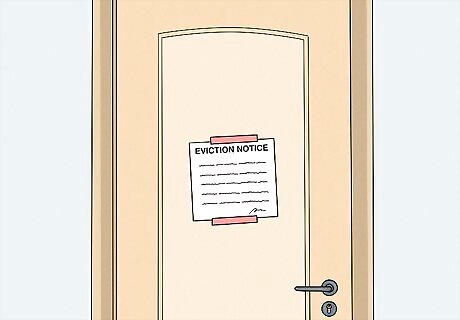
Serve the notice. Tape it to the front door and send it in the mail. This is the most common procedure to follow, but it could be different in your state, so make sure to double check. In order to make sure there's no question whether the tenant received the notice, tape a copy to the front door of the house or apartment and send another copy through the certified mail. Although you may be tempted to rely upon an informal text, email or even oral notice to the tenant, you must supplement that with "proper written notice", as required by your state laws, if you plan to follow through with an actual eviction by court order. It's very important to follow the correct procedure for notifying the tenant of the impending eviction. If you have to go to court later, you don't want the tenant to be able to tell the judge that he or she wasn't properly notified. This argument is commonly used against landlords in court. A case that should be in the bag because the tenant hasn't paid rent in 5 months could become very complicated if you don't follow the rules from the beginning.

Wait for the tenant to respond. In many cases, this official notice will light a fire under the tenant and compel them to pay or leave. Wait the entire allotted time before taking any further action. If the tenant does not leave, it's time to get serious and take it to court.
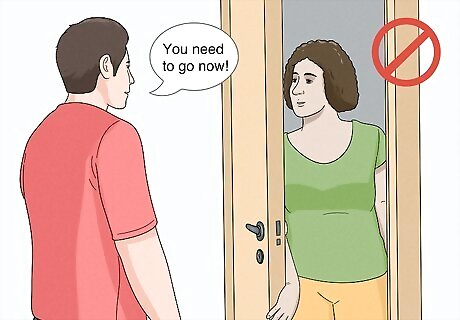
Do not attempt to forcibly evict the tenant on your own. Never threaten the tenant, put the person's possessions out on the street, turn off their utilities, or try to forcibly remove the tenant on your own. Any of these actions could bring you big legal troubles when its time to go to court. From this point on you need to be extremely careful to follow the process dictated by your state laws. No matter how upset you might be, it's better to play by the book.
Going to Court

File the eviction notice at the courthouse. Bring a copy of the notice and proof that you sent it by certified mail to show that the deadline for a response from the tenant has come and gone. You'll have to pay a fee to formally file the eviction case. The clerk will give you a case number and arrange for you to have a court hearing on a certain date. Serve the tenant with the court complaint. As with the eviction notice, there are rules about the proper procedure for notifying the tenant of your complaint and the summons to court on a particular date. The court clerk can help you make sure you understand your obligation. You may need to hire a process server, in some cases, or pay the court to have the sheriff serve the papers. If you haven't already consulted with an attorney, now might be a good time to do so. Find someone who can help you prepare for your court hearing and finish the eviction process.
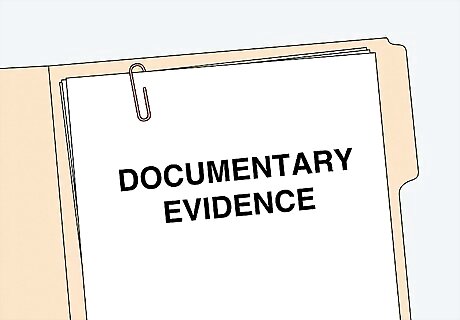
Prepare for the court hearing. Before the hearing, collect proof that you have just cause to evict the tenant. You'll need to be able to show without a doubt that the tenant didn't pay rent or violated the lease in some other way. Here are a few of the documents you should bring: The lease agreement Emails, texts and voicemails exchanged with the tenant or witnesses Bounced checks Photographs of damaged property or other indications that the lease was violated A copy of the eviction notice and proof that it was received (such as a receipt from the post office or printout of the certification report) Sworn affidavits (statements) by witnesses and others of relevant facts related to your case (such as damage estimates by contractors), police reports Identify any witnesses who you want to appear in court and request that the court (or your attorney) issue them a subpoena. In some cases the tenant may also submit an "answer" or "counterclaim", or even a motion for "discovery" in reply to your complaint. Your lawyer will help you deal with each of these; and they often have very short due dates. A tenant may voluntarily move out prior to the court date, and you should call the clerk to cancel the hearing, if not also to dismiss the case.
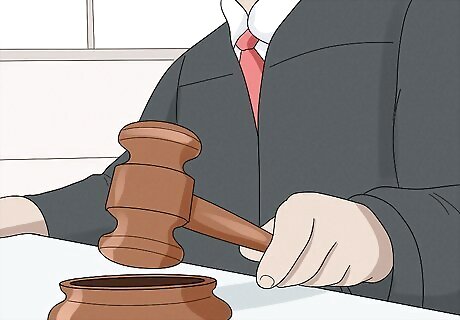
Attend the court hearing. Dress appropriately. Arrive early. Be professional and honest, and avoid getting too angry or emotional. If you have proof that you upheld your end of the lease but the tenant did not, then the ruling should go in your favor. Consult with your attorney regarding specific things you should say or do in court that might help you get an edge in your state. Be prepared to show that you followed the proper procedure for issuing the eviction notice, and service of court process, since many tenants make the claim that they didn't know they had to move out or weren't given enough time to do so. When the judge gives a ruling, known as an "order of eviction", or "writ of possession", the tenant will have a certain amount of time by which to move out. It's usually 2 to 3 days, but may be 5 or more, assuming the tenant doesn't file an appeal. If the court denies your petition for an eviction, you may still have other options in court, so discuss it with your attorney to determine your next steps.
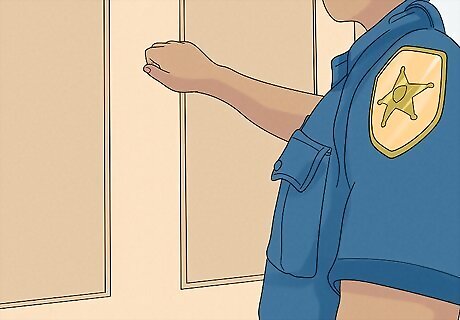
Involve the sheriff if the tenant still won't leave after being ordered to do so. If the tenant still refuses to leave, even after attending a court hearing and getting formally evicted, wait the allotted amount of time and go back to the courthouse to involve the sheriff. In most states you have the right to go to the property with the sheriff, who will forcibly remove the tenant if necessary. After the tenants have vacated or been ejected, make arrangements to have the locks changed and the tenants' belongings moved to storage, as may be required by law. Again, be sure to know your state's laws and follow them to the letter to the very end. If you try to remove the tenant on your own, or if you get rid of his or her property not in accordance with the law, the tenants could end up having a case against you.
Collecting the Rent
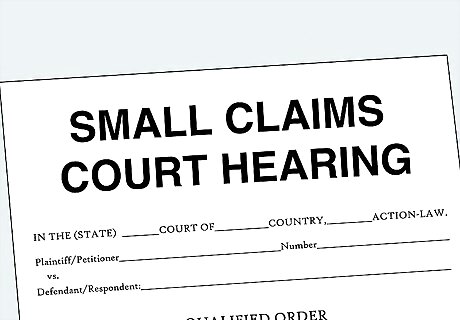
Go to small claims court. If you're owed enough rent to make it worth it to sue the tenant for back pay, you might be able to take them to small claims court at the same time as you evict them. Check the laws in your state to see whether this is possible. If not, you'll have to file a separate lawsuit to sue for rent. If the tenant is unemployed and seems unlikely to be able to pay anytime soon, decide whether it's worth it to sue. Filing a small claims lawsuit might be more trouble than it's worth, since you'll have to pay a fee and hire a lawyer. If you're only owed a few thousand dollars, it might be better just to make a fresh start with the new tenant who moves in. If the tenant is employed, the judge may rule that his or her wages can be garnished in order to pay the debt.

Use a private debt collector. Some debt collection companies specialize in helping landlords collect rent from evicted tenants. The debt collectors will take charge of collecting rent as well as notifying the 3 major credit bureaus of the eviction. Follow your state's laws for disposal of the tenants' abandoned property, which may allow you to keep them or sell them at auction, after proper notices to the former tenants and elapsed time periods, thus offsetting some of your losses.




















Comments
0 comment